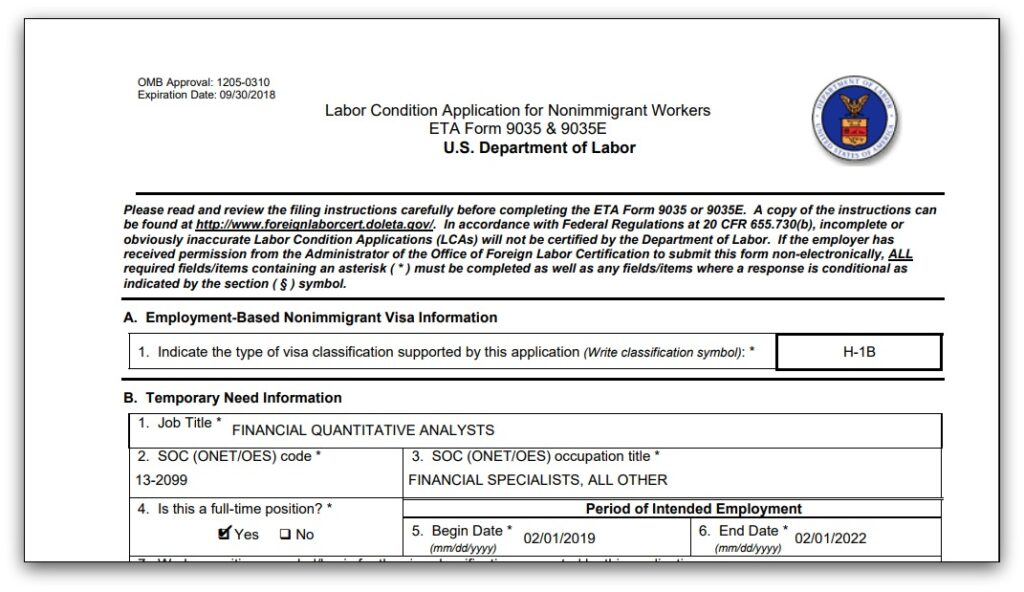The Labor Condition Application (LCA) is an application filed by a U.S. employer on behalf of a foreign national worker who will apply for certain types of non-immigrant work visa. An employer generally submits the LCA ahead of hiring workers in the H-1B, H-1B1, and E-3 statuses. Before the U.S. employer may hire the foreign worker, the U.S. Department of Labor must approve the LCA.

Employers use the U.S. Department of Labor’s ETA Form 9035 to submit the Labor Condition Application to the Department of Labor Employment and Training Administration (DOLETA). Generally, employers (or their legal representatives) must submit the application through the Department of Labor’s iCERT online system. Filing a well-prepared application ensures a problem-free, quick approval from the government. The government typically takes less than seven working days to approve or reject the Labor Condition Application. An approved LCA is valid for up to three years for H-1B and H-B1 cases, and valid up to two years for E-3 cases.
LCA Attestations
A well-prepared LCA contains four different attestations from the employer. The attestation is a factual statement supported with evidence. In fact, the U.S. Department of Labor requires employers to provide and maintain documentation supporting that the following four main labor conditions have been met:
Wages (Prevailing wage requirement)
Employers must provide non-immigrant workers the same or better wages and benefits that the company provides to other company employees and regional workers doing similar work. They must also provide non-immigrant workers the prevailing wages and benefits for similar jobs in their geographic area.
Working Conditions
The U.S. employer must attest that the hiring of non-immigrant workers will not adversely affect the working conditions of similarly employed workers. As such, the company must offer non-immigrant workers similar working conditions as native U.S. workers.
Labor Disputes
The U.S. employer must attest that there is not a strike, lockout, or work stoppage at the employment location on the day the Labor Condition Application is filed. Further, the employer attests that if such a strike, lockout, or work stoppage occurs after submitting the application, the employer will notify ETA within three days of such occurrence. The LCA cannot be used to a work authorization petition until the ETA has determined that the labor dispute is over.
Notice
Finally, the employer must attest that as of the date of LCA, they will provide notice of the application to other workers within the company. The employer must notify any employee bargaining representatives. If there is no representative, the notification must be clearly posted for 10 days in two locations at the workplace. Additionally, the employer must provide a copy of the application to the prospective non-immigrant employee.
For the purposes of filling out the Labor Condition Application, employers will also state information such as job title, salary, anticipated length of employment and any other non-immigrant workers that will be hired. The employer must also disclose if the H-1B, H-1B1 and E-3 worker will be placed at a third-party organization or client facility.
LCA Fees
There is no filing fee for a Labor Condition Application for non-immigrant workers. The LCA is completely free for the employer and the non-immigrant worker. However, the employer may have some legal fees to prepare the LCA if they choose to use an attorney.
What Non-Immigrant Workers Should Know
If you are outside the United States, you may directly apply for an H-1B1 or E-3 visa at your local consulate based on the approved LCA and other supporting documents.
However, H-1B applicants and any worker already inside the United States must also obtain an approved Form I-129 (Petition for a Nonimmigrant Worker). Employers hiring an H-1B worker must file the I-129F petition with the certified LCA. Upon approval, the H-1B, H-1B1 or E-3 visa may be issued to the worker already in the U.S.
Labor Condition Application for Non-immigrant Workers
The Labor Condition Application process is for non-immigrant workers. Non-immigrant means that the U.S. government grants the foreign national a temporary visa for employment purposes. This is in contract to the labor certification process and employment-based immigrant visa categories (EB visas). U.S. employers who sponsor foreign national workers in an immigrant visa category (like EB-2 or EB-3) must go through a more strenuous and lengthy labor certification process. Compared to labor certification, the LCA is straight-forward, quick and costs nothing.
| Labor Condition Application | Labor Certification | |
|---|---|---|
| Type of Visa | Non-immigrant (temporary) visas: H-1B, H-1B1, or E-3 | Immigrant (permanent) visas: Employment-based visa (such as an EB-2 visa or EB-3 visa) that results in a green card |
| Time Frame | 7 business days or less | A few months |
| Burden of Proof | The employer needs to demonstrate that the worker is being paid at least the prevailing wage for that region and occupation, and comparable to native workers in the firm, and that employing the worker will not adversely affect current workers. However, the employer does not need to demonstrate that there is no qualified native U.S. worker for the job. | The employer needs to demonstrate that there is no qualified U.S. worker willing to do the job at a comparable wage, and needs to have made a good-faith effort to recruit a native U.S. worker. |
| Cost | N/A | Significant (varies) |
